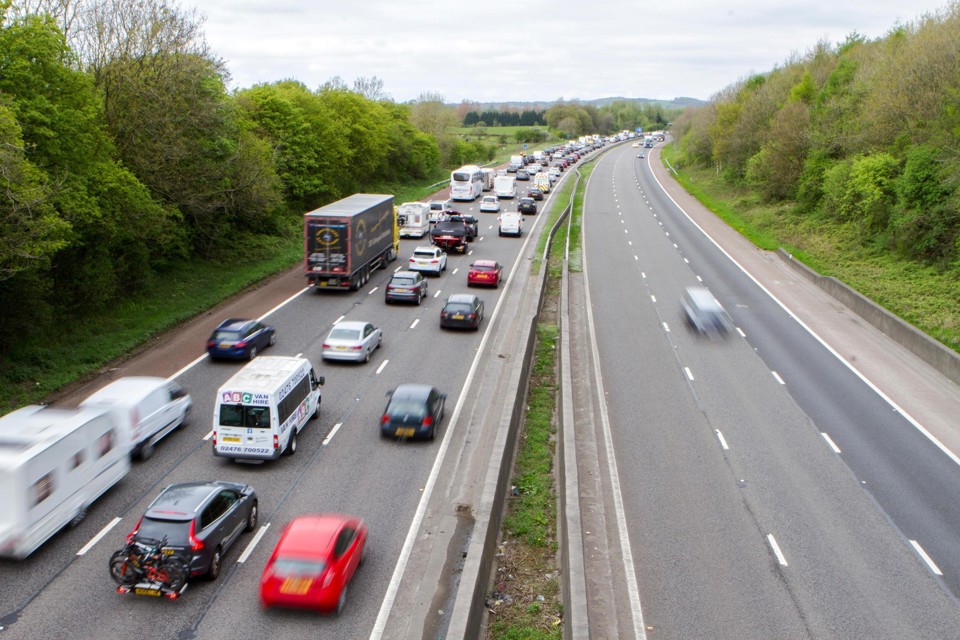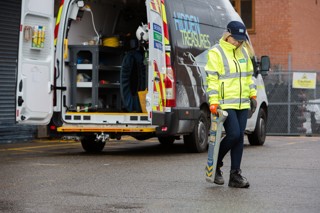Two-out-of-five fleets expect the number of company cars they operate to decrease over the next 12 months, new research suggests.
Almost one-in-five (17%) say the number of vans they operate will fall although a much larger proportion, 28%, expect their operations to grow.
The downsizing of so many vehicle fleets comes after a tumultuous year for the industry, which saw significant numbers of company cars and vans stood idle, as many businesses were forced to shut operations during the pandemic.
Almost three-quarters (72.6%) of respondents to a Fleet News survey during the first lockdown, said fewer than 10% of their company cars were being driven for work.
Any semblance of normality was reserved for just one-in-20 fleets, which said more than 75% of their company car drivers were still on the road.
Vehicle deliveries and collections were halted as leasing companies worked with fleet decision-makers to extend contracts, where possible, and mitigate potential charges being incurred during the pandemic.
Almost a year later, with the country in its third national lockdown, the latest survey of fleet decision-makers from Fleet News, suggests Covid-19 will continue to dominate the fleet agenda for the next 12 months.
Coronavirus is considered to be the biggest challenge the industry faces by more than one-in-four respondents (27%). Only electrification, which is highlighted by almost a third (29%) of fleets, is seen as a greater challenge.
Funding methods set to shift
There was a degree of positivity from a number of fleets who expect to grow their vehicle operations over the next year.
One-in-six respondents say the number of company cars on their fleet will increase during 2021, with 42% expecting them to stay the same.
The picture is even more positive regarding vans, with more than a quarter (28%) of fleets saying the number of LCVs they operate will increase. More than half (55%) said they would stay the same.
The majority (71%) of new company cars joining the fleet will be funded via contract hire, with salary sacrifice (14%) and flexible rental (14%) also being employed.
However, very few cars will be bought outright, accelerating a trend away from purchasing.
In the 2020 Fleet200, contract hire (operating lease and finance lease combined) accounted for almost 78% of company car funding, with outright purchase taking almost 17%. Salary sacrifice was below 1%, but is now predicted to take a much greater share, as is flexible rental.
Contract hire will also fund the majority (64%) of new vans joining fleets this year, with one-in-four (24%) new additions being bought outright and flexible rental being used as the main way of acquiring new vehicles by 12% of respondents.
This also suggests a seismic shift in funding dynamics.
The Fleet200 report showed 55% of vans acquired via contract hire with 37% bought outright and 7.3% on flexible rental.
This latest Fleet News survey indicates a clear move away from purchase towards leasing and flexi-rent, both of which arguably give companies greater security in times of uncertainty.
Decline blamed on job losses
Job losses were blamed by a significant 43% of respondents for the expected decline in the number of cars and vans they operate over the next 12 months.
Estimates for August to October 2020 show an estimated 1.69 million people were unemployed, up 411,000 on the same period the previous year and up 241,000 on the quarter, according to the latest data from the Office of National Statistics (ONS).
The UK unemployment rate, in the three months to October 2020, was estimated at 4.9%, 1.2 percentage points higher than a year earlier and 0.7 percentage points higher than the previous quarter.
Meanwhile, redundancies reached a record high of 370,000 in the three months to October 2020, an increase of a record 217,000 on the quarter, although the number of redundancies fell slightly in October 2020.
Early estimates for November 2020, indicate that the number of payrolled employees fell by 2.7% compared with November 2019, which is a fall of 781,000 employees; since February 2020, 819,000 fewer people were in payrolled employment.
Furthermore, the UK economy shrank by 2.6% in November as the second national lockdown in England reduced economic activity.
November’s decline came after six consecutive months of growth, with a 0.6% improvement in October.
The services sector was hit hard, although some manufacturing and construction activity improved. It is now 9.9% below the level of February 2020, the ONS said.
Chancellor Rishi Sunak said the figures showed “it’s clear things will get harder before they get better”.
Speaking to MPs in the House of Commons, last week, he said: “Even with the significant economic support we’ve provided, more than 800,000 people have lost their job since February.
“Sadly, we have not and will not be able to save every job and every business.”
The fiscal stimulus provided so far by the Government has amounted to more than £280 billion, while 1.2 million employers had furloughed almost 10 million employees.
Life under lockdown
ONS director for economic statistics Darren Morgan said: “The economy took a hit from restrictions put in place to contain the pandemic during November.
“However, many businesses adjusted to the new working conditions.
“Car manufacturing, bolstered by demand from abroad, housebuilding and infrastructure grew and are now all above their pre-pandemic levels.”
Fleets are also better placed to cope with life under lockdown 3, according to the Association of Fleet Professionals (AFP).
“The situation is completely different from last spring, when we were faced with a long list of unknowns and had to improvise our way through an unprecedented situation,” explained AFP chair, Paul Hollick.
“We once again are finding ourselves in an emergency but it’s now a familiar one, and fleets know what needs to be done.”
It is perhaps no surprise that given the testing times that two-in-five fleets (41%) expect to spend more time managing the fleet in 2021, with a similar amount (42%) saying they will spend about the same amount of time.
Just one-in-six respondents (16%) to the survey said they would be spending less time managing their fleet over the next 12 months.
Hollick is urging fleet decision-makers to make “positive use” of their time during the current lockdown, by considering issues such as the future shape of their fleet.
Furthermore, he said: “If the vaccination programme is effective quickly, we could be looking at a fairly rapid remobilisation of relatively normal operations.”
That fact has not been lost on the vast majority of fleet decision-makers, with almost three-quarters (73%) of respondents saying the biggest challenge they faced was not Covid-19.
Biggest fleet challenges
Electrification dominates the fleet agenda, considered the biggest challenge by almost one-in-three fleets. Cost reduction was cited by one in seven respondents (14%) and vehicle availability by one in six (16%).
Sales of pure electric and plug-in hybrid cars soared last year, with more than 175,000 vehicles registered, representing a growth of 140%. More than two-thirds (68%) were registered to fleets.
However, concerns around charging infrastructure, vehicle pricing and lead times remain, ahead of the Government’s ban on the sale of new diesel and petrol cars and vans from 2030.
Fleet News reported in December how almost two-thirds of fleets believe implementing a ban on the sale of new petrol and diesel cars from 2030 is too soon.
Fewer than a third (29%) agreed with the implementation date for cars. One-in-five fleets (21%) would have preferred the ban for cars to be introduced from 2035, with a similar number (22%) suggesting a start date of 2040 – the original date chosen by the Government.
Survey respondents also vented their frustration. One fleet decision-maker said: “The cost to purchase electric-only vehicles to carry on our work will close us down.”
Another added: “We run a small business with fleet of six light commercial vehicles, with two being fully electric, but the lack of options for electric replacement for four of our trucks makes it difficult to switch in time for the Ultra-Low Emission Zone (ULEZ) in London, so we might have to downsize as a result.”
The recent temporary closure of Honda’s Swindon plant, because of parts shortages, will also further worry those fleets concerned over lead times for vehicles.
The Vehicle Remarketing Association (VRA) is warning that the Honda closure could be the “tip of the iceberg” for new car supply issues in 2021.
VRA chair Philip Nothard said that the problem, believed to be caused by poor availability of semiconductors, was potentially a sign of things to come from all manufacturers.
“Car manufacturing is based on incredibly complex and geographically diverse supply chains all clicking perfectly into place at the right time,” he said. “Any disruption to those processes can bring the production line grinding to a halt.”
Several manufacturers worldwide, certainly not just Honda, are reportedly having issues with semiconductor supply as a knock-on effect of the pandemic. But Nothard said: “Our concern is that this is just the tip of the iceberg.
“While there is new car stock in the pipeline, there is a strong argument that we are only now really starting to see the impact of the coronavirus crisis on supply and it could be that we will see a range of other problems throughout the year.”
One survey respondent said: “There is a misalignment between Government benefit-in-kind tax policy and vehicle availability.”
This article was first published in the January edition of Fleet News.























Login to comment
Comments
No comments have been made yet.